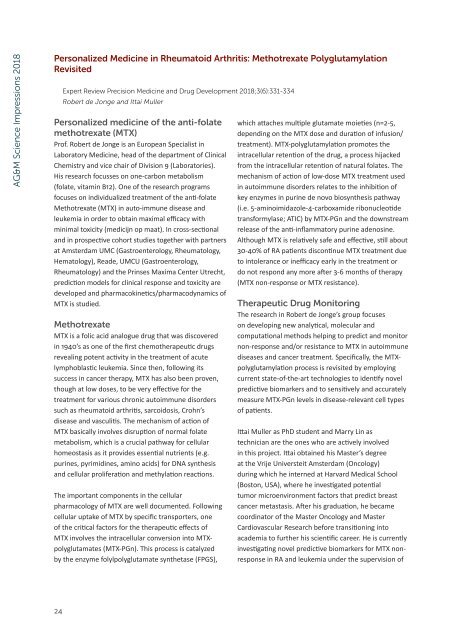AG&M annual report 2018
Create successful ePaper yourself
Turn your PDF publications into a flip-book with our unique Google optimized e-Paper software.
AG&M Science Impressions <strong>2018</strong><br />
Personalized Medicine in Rheumatoid Arthritis: Methotrexate Polyglutamylation<br />
Revisited<br />
Expert Review Precision Medicine and Drug Development <strong>2018</strong>;3(6):331-334<br />
Robert de Jonge and Ittai Muller<br />
Personalized medicine of the anti-folate<br />
methotrexate (MTX)<br />
Prof. Robert de Jonge is an European Specialist in<br />
Laboratory Medicine, head of the department of Clinical<br />
Chemistry and vice chair of Division 9 (Laboratories).<br />
His research focusses on one-carbon metabolism<br />
(folate, vitamin B12). One of the research programs<br />
focuses on individualized treatment of the anti-folate<br />
Methotrexate (MTX) in auto-immune disease and<br />
leukemia in order to obtain maximal efficacy with<br />
minimal toxicity (medicijn op maat). In cross-sectional<br />
and in prospective cohort studies together with partners<br />
at Amsterdam UMC (Gastroenterology, Rheumatology,<br />
Hematology), Reade, UMCU (Gastroenterology,<br />
Rheumatology) and the Prinses Maxima Center Utrecht,<br />
prediction models for clinical response and toxicity are<br />
developed and pharmacokinetics/pharmacodynamics of<br />
MTX is studied.<br />
Methotrexate<br />
MTX is a folic acid analogue drug that was discovered<br />
in 1940’s as one of the first chemotherapeutic drugs<br />
revealing potent activity in the treatment of acute<br />
lymphoblastic leukemia. Since then, following its<br />
success in cancer therapy, MTX has also been proven,<br />
though at low doses, to be very effective for the<br />
treatment for various chronic autoimmune disorders<br />
such as rheumatoid arthritis, sarcoidosis, Crohn’s<br />
disease and vasculitis. The mechanism of action of<br />
MTX basically involves disruption of normal folate<br />
metabolism, which is a crucial pathway for cellular<br />
homeostasis as it provides essential nutrients (e.g.<br />
purines, pyrimidines, amino acids) for DNA synthesis<br />
and cellular proliferation and methylation reactions.<br />
The important components in the cellular<br />
pharmacology of MTX are well documented. Following<br />
cellular uptake of MTX by specific transporters, one<br />
of the critical factors for the therapeutic effects of<br />
MTX involves the intracellular conversion into MTXpolyglutamates<br />
(MTX-PGn). This process is catalyzed<br />
by the enzyme folylpolyglutamate synthetase (FPGS),<br />
which attaches multiple glutamate moieties (n=2-5,<br />
depending on the MTX dose and duration of infusion/<br />
treatment). MTX-polyglutamylation promotes the<br />
intracellular retention of the drug, a process hijacked<br />
from the intracellular retention of natural folates. The<br />
mechanism of action of low-dose MTX treatment used<br />
in autoimmune disorders relates to the inhibition of<br />
key enzymes in purine de novo biosynthesis pathway<br />
(i.e. 5-aminoimidazole-4-carboxamide ribonucleotide<br />
transformylase; ATIC) by MTX-PGn and the downstream<br />
release of the anti-inflammatory purine adenosine.<br />
Although MTX is relatively safe and effective, still about<br />
30-40% of RA patients discontinue MTX treatment due<br />
to intolerance or inefficacy early in the treatment or<br />
do not respond any more after 3-6 months of therapy<br />
(MTX non-response or MTX resistance).<br />
Therapeutic Drug Monitoring<br />
The research in Robert de Jonge’s group focuses<br />
on developing new analytical, molecular and<br />
computational methods helping to predict and monitor<br />
non-response and/or resistance to MTX in autoimmune<br />
diseases and cancer treatment. Specifically, the MTXpolyglutamylation<br />
process is revisited by employing<br />
current state-of-the-art technologies to identify novel<br />
predictive biomarkers and to sensitively and accurately<br />
measure MTX-PGn levels in disease-relevant cell types<br />
of patients.<br />
Ittai Muller as PhD student and Marry Lin as<br />
technician are the ones who are actively involved<br />
in this project. Ittai obtained his Master’s degree<br />
at the Vrije Universteit Amsterdam (Oncology)<br />
during which he interned at Harvard Medical School<br />
(Boston, USA), where he investigated potential<br />
tumor microenvironment factors that predict breast<br />
cancer metastasis. After his graduation, he became<br />
coordinator of the Master Oncology and Master<br />
Cardiovascular Research before transitioning into<br />
academia to further his scientific career. He is currently<br />
investigating novel predictive biomarkers for MTX nonresponse<br />
in RA and leukemia under the supervision of<br />
24



